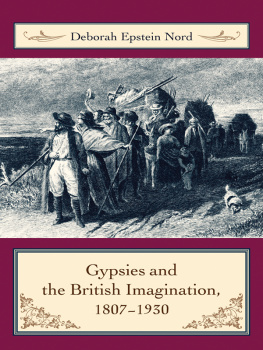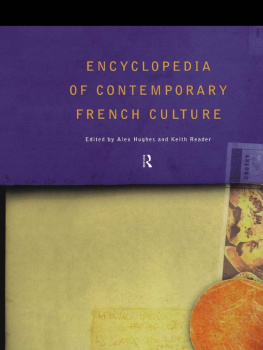This electronic edition published in 2017 by
The American University in Cairo Press
113 Sharia Kasr el Aini, Cairo, Egypt
420 Fifth Avenue, New York, NY 10018
www.aucpress.com
Copyright 2017 by Alexandra Parrs
All rights reserved. No part of this publication may be reproduced, stored in a retrieval system, or transmitted in any form or by any means, electronic, mechanical, photocopying, recording, or otherwise, without the prior written permission of the publisher.
ISBN 978 977 416 830 7
eISBN 978 1 61797 848 7
Version 1
I n a busy street of central Cairo, I was once approached by a woman dressed in a long black abaya selling packs of paper tissues. She had tresses of very blond hair coming out of her dirty headscarf, and she was looking intense and desperate. The Egyptian friend I was with gently pulled me away from the woman: Be careful, she is a Ghagar. She is a thief. Later, I learned that Ghagar are considered a tribe of Middle Eastern Gypsies. Their women like to dye their hair yellow. Most of them are supposed to be beggars or thieves. They are fortune-tellers or dancers or prostitutes. It is better to avoid them, as they will not bring good fortune to anyone, and they will ask for extravagant amounts of money to rid you of the evil eye.
So much of this first encounter and the discussions that followed illustrate the perceptions and misconceptions associated with Gypsies in general, and Egyptian Ghagar more specifically. Interestingly, Ghagar seem to be ascribed an alienating alterityas if they were others by essence while at the same time being denied any kind of history or even the right to own a precise identity. They may be that dangerous other, from another tribe, or from another social class (a deep underclass). As the ethnomusicologist Kevin Holmes cynically noted about Egyptian Ghagar: No one really knows where they are from, and no one really cares. Somehow, this ignorance cruelly reminds one of the ignorance of medieval Europeans who attributed Egyptian roots to the Gypsies, dark foreigners coming from some place in the Orientscary and fascinating others.
Middle Eastern Gypsies are called the Dom, as a mirror name to the European Roma and the Armenian Lom, but that name is mostly used by scholars and rarely by Egyptians or by members of the Dom communities themselves. They are also called Ghagar, Nawar, or Halebi in Upper Egypt. In urban centers, they are called Hanagra when referring specifically to members of the community who commit crimes. The terms all have negative connotations in Arabic.
Many stories circulate about the Egyptian Ghagar, which is the term I will mostly use as it is the most widely acknowledged one in Egypt, particularly in the urban centers of Cairo and Alexandria. There are stories of Ghagar training their monkeys to steal from unsuspecting Egyptians or to kidnap Egyptian children, as well as stories about Ghagar women traveling to the holy city of Mecca in Saudi Arabia to rob pilgrims, or of Ghagar disrupting public order during mulids, the popular saint festivals in Egypt. There are also stories about their origins: Ghagar may have descended from one of the lost tribes of Israel, or perhaps they were slaves who arrived with Roman legions more than two thousand years ago and then stayed in Egypt to form a lower class, akin to a caste. They may also have been the thieves who stole some of the large nails used to crucify Jesus Christ: according to some narratives, this brought them good luck because they alleviated his suffering; according to others, it brought them bad luck and turned them into eternal, rejected wanderers. There is a plethora of stories, legends, stereotypes, and very little else. The Ghagar, the Egyptian Gypsies, seem largely invisible in academia, forgotten in public policy, and perhaps only existing as parcels in popular imagination. Or are they? My initial goal in starting this research was to answer that question and to explore who the Ghagar are and why they seem, at least superficially, so strikingly socially absent in Egypt.
It is a conspicuous fact that talking about Gypsies or Gypsiness is in itself controversial, as the group(s) bears many origins and possesses flexible boundaries and subclassifications. Establishing a framework of analysis is also a complex task. Scholars have sometimes tried to use the paradigm of diaspora to show both that Gypsies actually do not constitute a diaspora in the classical sense of the term and also that some more constructivist dimensions of the concept of diaspora can nonetheless be used for analytical purposes (Toninato 2009; Renard, Manus, and Fellman 2009; Willems and Lucassen 2000). The primordialist definition of diaspora given by William Safran (1991, 1999) attributes to diasporas a few essential traits: they are dispersed groups that suffered from a traumatic departure, have constituted collective memories that serve as an anchor for the group identity, create strong boundaries that prevent their full integration into the host society, rely on a myth of return to the (often-idealized) homeland, and engage in certain political actions such as those of long-distance nationalists (as defined by Benedict Anderson [2011]). While some of these attributes fit Gypsiesdeparture from a homeland, dispersion among many other nations, and the creation and maintenance of boundaries between Gypsies and outsidersthe groups also lack some of those crucial features, and it would be dangerous and unproductive to try to fit them into a model that their very existence seems to negate. For instance, the notion of trauma in the departure from a homeland, which could be a basis for diasporic identity, may be absent. The departure may not have been brusque but progressive, made up of successive waves and motivated by a variety of elements such as war, poverty, entertainment, and religion, not necessarily persecution or violence.
Secondly, the homeland is traditionally not a core part of Gypsy/Romani identity. Linguistic research may point toward India as a possible country of originnearly a millennium agoof at least part of the contemporary Gypsy population. But that does not mean that all the Gypsies of this world live in awareness of a homeland from which they once moved or were dispelled and suffer all the traumatic consequences: There is no collective, cherished memory, no developed or documented mythologization of an ancestral home to which they hope to return one day (Willems and Lucassen 2000, 268). The homeland is not a clear component of Gypsy/Romani identity itself, either. While differences are not anchored in a precise nation-state which would contribute to fostering diasporic practices in their most traditional definitions, their perceived foreignness still anchors Gypsy groups in an elsewhere (which is not in the land where they live), and the identified Indian origins serve to unify the group and give substance to its otherness, more than they legitimately create a true Indian origin. The concept of collective memory is not associated with a homeland, even if some cultural traits distinguish members of the group from the cultural majority of the countries where they livefor instance, the use of the Romani language and to a lesser extent the Domari language, or some essentialized cultural characteristics.
The theories of a migration out of India were mostly established by non-Gypsy linguists who attempted to connect Gypsies to a specific point of departure in order to make sense of the group in a European context, where the construct of the nation-state was something fundamental, a unit of analysis necessary for scientific research. In more recent years, the notion of Indian origins has been appropriated by some Romani organizations with the objective of giving an understood or normative meaning to the group and to use it as a basis for the creation of an ethnic minority. Some scholars have pointed out that, ironically, when Roma present themselves as an ethnic minority, they actually give the ethnic majority and the nation-state the power to model Romas self-representations (Acton and Gheorghe 2001). In the same vein, Paloma Gay y Blasco noted that the diasporization of the group may actually be a sign of the internalization of the concept of nation-state more than an act of resistance. Other scholars continue to describe Gypsies as living in the present rather than in the past, representing them as a people without a nation or history. All in all, and despite the politicization of narratives, Gypsies are not associated with the notion of a desired return to a homeland, be it real, mythical, or instrumentalized. They are not involved in any political participation in that homeland, which is the traditional goal of diasporic long-distance nationalists (Anderson 2011). As a matter of fact, one commonality among Gypsies may have actually been that their very existence challenges the hegemonic modern thinking that uses the concept of the nation-state as an undisputed unit of analysis, and on which national/ethnic identities are built. Wim Willems and Leo Lucassen have tried to apply the concept of diaspora to Gypsies specifically to engage in a general critique of the concept itself. They conclude in these terms:











